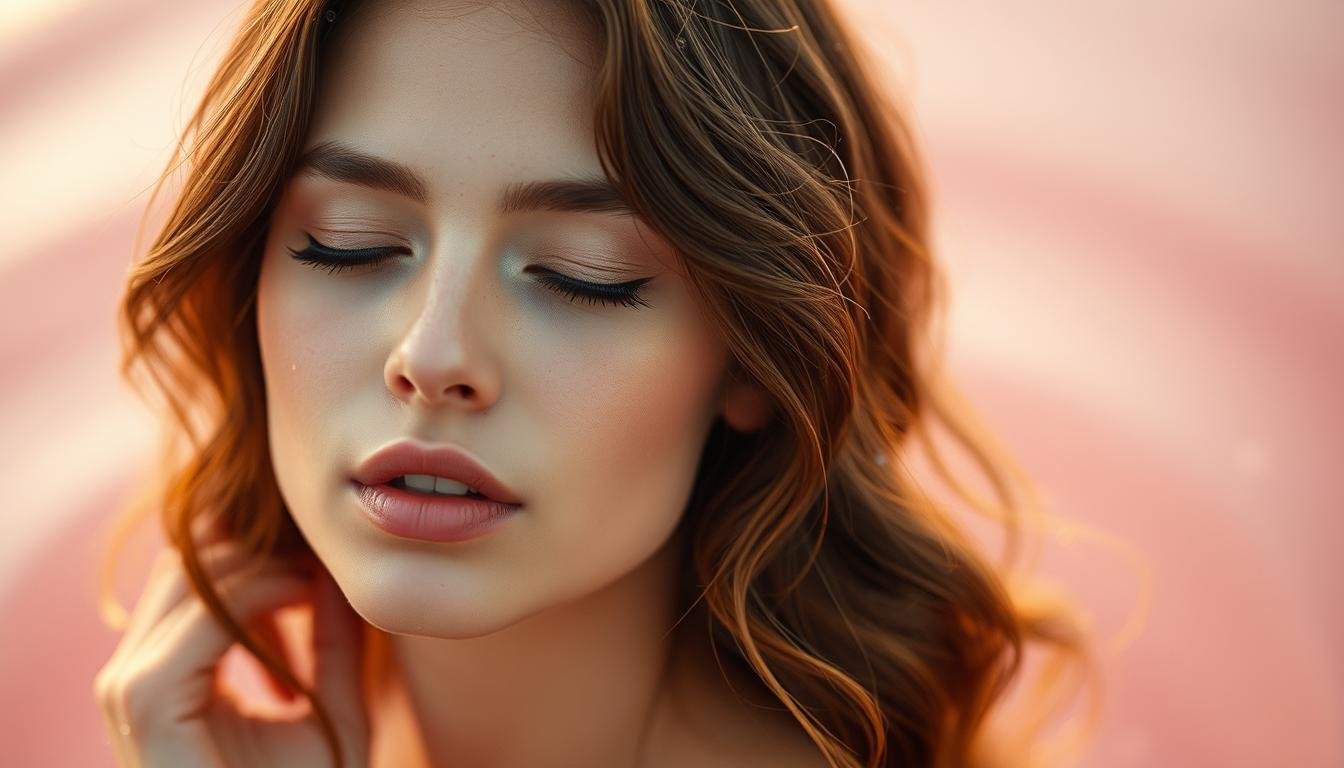The Impact of Water on Skin Hydration and Radiance
Discover the vital role drinking water for skin hydration plays in achieving a luminous complexion and overall skin health. Stay hydrated for radiant beauty.

Did you know almost 60% of your skin is water? Drinking water helps keep your skin moist and bright. If you don’t drink enough, your skin can get dry and tired.
Water is very important for your skin. It helps your skin look healthy and young. It also makes fine lines less visible and makes your skin glow.
Water does more than just hydrate. It helps remove bad stuff from your skin, making it clearer. When your skin is well-hydrated, it looks brighter and more youthful.
Drinking water regularly is key to a glowing complexion. It’s all about keeping your skin hydrated and looking its best.
The Role of Water in Skin Health
Water is key for healthy skin. It does more than just keep us hydrated. It helps keep our skin’s moisture barrier strong, makes our skin elastic, and boosts blood flow.
Drinking enough water is vital for glowing skin. Without enough, our skin can get dry and develop problems.
Supporting skin’s natural moisture barrier
A strong moisture barrier keeps moisture in and bad stuff out. Drinking water helps keep this barrier strong. This makes our skin less likely to get dry or irritated.
Promoting elasticity by hydrating skin cells
Water keeps our skin cells elastic. When our skin has enough water, it can stretch and look young. This makes our skin look fresh and plump.
Enhancing blood circulation for a radiant complexion
Drinking water boosts blood flow to our skin. This brings important nutrients to our skin cells. Good blood flow makes our skin look alive and healthy.
How Dehydration Affects Skin
Dehydration can really hurt how your skin looks and feels. Many things can cause it, showing signs that your skin needs water. Knowing these signs helps fix skin problems.
Signs of dehydrated skin: dryness, flakiness, and dullness
Dehydrated skin often shows symptoms such as:
- Dryness, leading to a rough texture
- Flakiness, resulting in visible patches
- Dullness, causing skin to lack radiance
These signs mean your skin isn’t holding onto enough moisture. Daily things like weather and lifestyle choices can make it worse.
Increased appearance of fine lines and wrinkles
When your skin is dry, fine lines and wrinkles show more. Dehydrated skin loses its stretchiness. It’s key to keep it hydrated.
Without enough water, your skin looks older. A good skincare routine helps fight dryness.
Disruption of the skin’s natural barrier leading to irritation
A broken skin barrier lets irritants in, making skin sensitive. Things like pollution or harsh weather can make it worse. Gentle products with ingredients like hyaluronic acid help fix it.
Benefits of Drinking Adequate Water for Skin Hydration
Drinking water helps your skin look great. It makes your body get rid of bad stuff. This makes your skin clear and healthy.
Flushing out toxins for a clearer complexion
Drinking enough water is key for cleaning your body. It helps your kidneys work well. This gets rid of bad stuff in your body.
It makes your skin look fresh and clean. Drinking water helps your skin glow with health.
Improving skin plumpness and reducing dryness
Drinking water makes your skin look better. It makes your skin cells bigger. This makes your skin look firm and young.
It also makes your skin less dry. Drinking water helps fight signs of aging. It makes your skin look alive and healthy.
Supporting optimal skin cell regeneration and repair
Drinking water helps your skin heal fast. It brings nutrients to your skin cells. This helps your skin look young and fresh.
Drinking water is good for your skin’s health. It makes your skin look great for a long time.
| Benefit | Description |
|---|---|
| Flushing out toxins | Promotes clearer skin by eliminating impurities from the body. |
| Improving skin plumpness | Hydrated skin appears firmer and more youthful, reducing dryness. |
| Supporting skin regeneration | Enhances the skin’s ability to recover and maintain a healthy appearance. |
How Much Water Is Ideal for Hydrated Skin
Figuring out how much water to drink every day is key for keeping your skin hydrated. The usual advice is to drink eight 8-ounce glasses of water a day. But, your body might need more or less based on different things.
General recommendations for daily water intake
Women usually need about nine cups of water each day. Men need around 13 cups. Some groups, like breastfeeding or pregnant women, might need up to 16 cups or 96 ounces a day.
Adjusting water consumption based on activity and environment
Your water needs can change based on how active you are and where you live. For example, you should drink 8 to 12 ounces of water every 15 minutes when you’re exercising. After working out, make sure to drink more water too. If it’s hot or dry outside, you’ll need to drink even more water.
The balance between hydration from water and other fluids
Drinking water is important, but it’s not the only way to stay hydrated. Drinking herbal teas or other water-rich drinks can also help. Eating foods with lots of water, like fruits and veggies, adds to your hydration too. This mix helps keep your skin healthy and hydrated.

| Group | Water Intake Recommendations |
|---|---|
| Adult Women | 9 cups (72 oz) |
| Adult Men | 13 cups (104 oz) |
| Pregnant Women | 96 oz |
| Breastfeeding Women | 16 cups (128 oz) |
| Children (age in cups) | Age = Number of 8 oz glasses |
Factors That Influence Skin Hydration Through Water Intake
Many things can affect how well your skin holds onto water. Knowing these helps you keep your skin healthy.
Environmental factors like humidity and weather conditions
Winter air is usually drier, especially in cold places. This can dry out your skin. Indoor heaters make it even drier.
Strong winds and cold weather hurt your skin’s protective layer. This makes your skin lose more water. Taking long, hot showers can also dry out your skin.
Impact of diet and hydration-rich foods on skin health
What you eat affects your skin’s moisture. Eating foods like cucumbers and watermelon helps keep your skin moist. Eating lots of fruits and veggies helps your skin hold onto water better.
Age and its effect on the skin’s ability to retain moisture
As you get older, your skin doesn’t hold water as well. This is because it makes less oil and has less hyaluronic acid. It’s important to use moisturizers as you get older to keep your skin from getting too dry.
Some people’s skin is naturally drier because of their genes. This can make it harder to keep your skin moist.
Myths and Truths About Water and Skin Hydration
Many think drinking enough water fixes dry skin. But, it’s not that simple. Water is important, but it’s part of a bigger skincare plan. You need to think about both drinking water and using moisturizers.
Debunking the myth that water alone solves dry skin
Dehydration comes from many things, not just not drinking enough water. Heat, exercise, being sick, and what you eat can also cause it. Water is a start, but it’s not the only answer. Dry skin and feeling tired are signs you might be dehydrated, so you need to look at hydration in a bigger way.
Understanding water’s role as part of a holistic skincare approach
Water is just one part of taking care of your skin. Using products with omega-3 fatty acids helps too. They make your skin’s moisture barrier stronger. It’s all about finding the right balance of water, nutrients, and moisturizers for healthy skin.
The importance of topical hydration alongside drinking water
Drinking water and using moisturizers work together well. Thick creams might not be the best for dry skin. Using natural oils and special moisturizers can make your skin feel better.

Complementary Practices to Boost Hydration
Drinking enough water is key. But, adding other hydration practices helps keep your skin moist. These steps can really help your skin stay hydrated.
Eating water-rich foods like cucumbers and watermelon
Eating foods that are full of water is a smart move. Foods like:
- Cucumbers
- Watermelon
- Strawberries
- Celery
- Leafy greens
These foods not only hydrate you. They also give you important vitamins and minerals for healthy skin.
Using a humidifier to maintain skin moisture in dry climates
Humidifiers are great in dry places. They keep the air moist. This stops dry skin that’s common in dry areas.
They help keep your skin moist. This is key for keeping your skin soft and supple.
Avoiding excessive caffeine and alcohol, which dehydrate the skin
Drinking too much caffeine and alcohol is bad for your skin. They can make your skin dry. Drinking more water helps keep your skin balanced.
| Practice | Description | Benefits |
|---|---|---|
| Water-rich Foods | Incorporating fruits and vegetables with high water content. | Improves skin hydration, provides essential nutrients. |
| Humidifier | Using devices to add moisture to the air. | Prevents dry skin, especially in arid climates. |
| Caffeine and Alcohol | Limiting consumption of dehydrating beverages. | Helps to maintain optimal skin hydration levels. |
Signs Your Skin is Properly Hydrated
When your skin is well-hydrated, it shows in many ways. You might see a smooth texture and an even skin tone. These signs mean your skin is working well, making you look young and vibrant.
Smooth texture and an even complexion
Good hydration means fewer fine lines and a healthy glow. This shows your hydration efforts are paying off. Drinking enough water and using the right skincare helps your skin stay strong against bad stuff outside.
Reduced fine lines and an overall healthy glow
Your skin can fight off damage better when it’s hydrated. This keeps it looking young. It’s important to notice these signs to see if your hydration plan is working. Paying attention helps your skin look and feel better every day.

